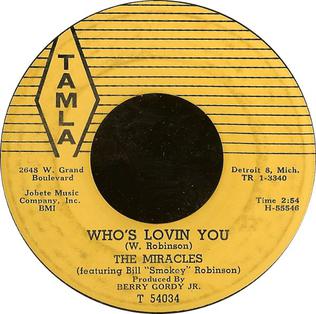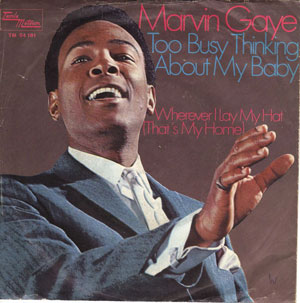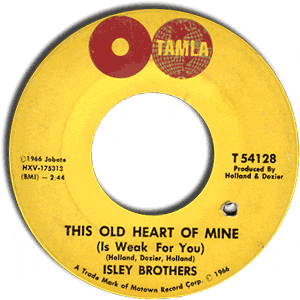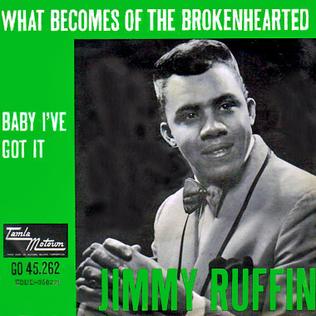Related Research Articles
The Isley Brothers are an American family musical group originally from Cincinnati, Ohio, that began as a vocal trio consisting of brothers O'Kelly "Kelly" Isley Jr., Rudolph Isley and Ronald Isley in the 1950s. With a career spanning over six decades, the group has enjoyed one of the "longest, most influential, and most diverse careers in the pantheon of popular music".

"My Girl" is a soul music song recorded by the Temptations for the Gordy (Motown) record label. Written and produced by the Miracles members Smokey Robinson and Ronald White, it became the Temptations' first U.S. number 1 single, and is currently their signature song. Robinson's inspiration for writing "My Girl" was his wife, Miracles member Claudette Rogers Robinson. The song was included on the Temptations 1965 album The Temptations Sing Smokey. In 2017, the song was selected for preservation in the National Recording Registry by the Library of Congress as being "culturally, historically, or artistically significant".

"Who's Lovin' You" is a Motown soul song, written in 1960 by William "Smokey" Robinson. The song has been recorded by many different artists including The Miracles, who recorded the 1960 original version, The Temptations, The Supremes, Terence Trent D'arby, Brenda and The Tabulations, John Farnham, Human Nature, En Vogue, Michael Bublé and Giorgia Todrani and Jessica Mauboy. The most famous version is attributed to The Jackson 5. Shaheen Jafargholi, then twelve years old, performed the song at Michael Jackson's public memorial service in July 2009.

"Too Busy Thinking About My Baby" is a Motown song written by Norman Whitfield, Barrett Strong, and Janie Bradford. The song was first recorded by The Temptations as a track on their 1966 album Gettin' Ready. Eddie Kendricks sings lead on the recording, which was produced by Whitfield. Jimmy Ruffin also recorded a version with The Temptations providing background vocals in 1966. It remained unreleased until 1997.
"That's the Way Love Is" is a 1967 Tamla (Motown) single recorded by The Isley Brothers and produced by Norman Whitfield.
"War" is a counterculture era soul song written by Norman Whitfield and Barrett Strong for the Motown label in 1969. Whitfield first produced the song – an obvious anti–Vietnam War statement – with The Temptations as the original vocalists. After Motown began receiving repeated requests to release "War" as a single, Whitfield re-recorded the song with Edwin Starr as the vocalist, with the label deciding to withhold the Temptations' version from single release so as not to alienate their more conservative fans. Starr's version of "War" was a No. 1 hit on the Billboard Hot 100 chart in 1970, and is not only the most successful and well-known record of his career, but it is also one of the most popular protest songs ever recorded. It was one of 161 songs on the no-play list issued by Clear Channel following the events of September 11, 2001.

"This Old Heart of Mine (Is Weak for You)" is a Holland–Dozier–Holland song that was a hit for American musical group the Isley Brothers in January 1966 during their brief tenure on Motown's Tamla label. Featuring Ronald Isley on lead vocal, "This Old Heart of Mine" peaked at number twelve on the Billboard Hot 100, and at number six on the Billboard R&B Singles chart.

"It's Your Thing" is a funk single by The Isley Brothers. Released in 1969, the anthem was an artistic response to Motown chief Berry Gordy's demanding hold on his artists after the Isleys left the label in late 1968.

"What Becomes of the Brokenhearted" is a hit single recorded by Jimmy Ruffin and released on Motown Records' Soul label in the summer of 1966. It is a ballad, with lead singer Jimmy Ruffin recalling the pain that befalls the broken-hearted who had love that's now departed. The song essentially deals with the struggle to overcome sadness while seeking a new relationship after a breakup.

"I Was Made to Love Her" is a soul music song recorded by American musician Stevie Wonder for Motown's Tamla label in 1967. The song was written by Wonder, his mother Lula Mae Hardaway, Sylvia Moy, and producer Henry Cosby and included on Wonder's 1967 album I Was Made to Love Her.

Greetings! We're The Monitors is the debut album by The Monitors, released in 1968.

The Brothers: Isley is the seventh album released by The Isley Brothers on their own T-Neck label on October 18, 1969. After years with other labels and fresh off the success of the It's Our Thing (1969) album, which included the hit title track, "It's Your Thing", the Isley Brothers celebrated their newfound independence by releasing another new album that year with this LP. The album yielded the Billboard Top 40 pop hit, "I Turned You On" and subsequent charters, "Was It Good to You?" and "Black Berries". It was also their second full venture into funk music, a genre they would dominate in the coming years. The album was remastered and expanded for inclusion in the 2015 released CD box set The RCA Victor & T-Neck Album Masters (1959-1983).
The Monitors were an American vocal group who recorded for Motown Records in the 1960s. The group, which consisted of lead singer Richard Street, Sandra Fagin, John "Maurice" Fagin, and Warren Harris, had two minor hits, "Say You", and then a cover of the Valadiers' "Greetings ", which reached #21 on the Billboard R&B Chart, and #100 on the Billboard Pop Singles Chart.
"Little Darling (I Need You)" is a 1966 single written and produced by Holland-Dozier-Holland and recorded and released by Marvin Gaye on the Tamla label.
"Put Yourself in My Place" is a song written by the Motown team of Holland–Dozier–Holland and recorded by at least four Motown recording acts during the sixties: The Elgins in 1965, The Supremes, Chris Clark and The Isley Brothers in 1966.

"Gonna Give Her All the Love I've Got" is a 1967 Soul song, originally recorded and made a hit by Jimmy Ruffin on Motown's Soul Label imprint. Ruffin's 1967 original version, from his album Jimmy Ruffin Sings Top Ten, reached the Pop Top 30, peaking at #29, and was a Top 20 R&B Hit as well, peaking at #14. It was also a hit in Britain, reaching #26 on the UK Singles Chart. The song has a social context: it depicts a man anticipating his release from prison on the morrow, when he'll return home on a train to "the girl that I left behind," promising himself that he will reward her steadfast love for him by "giv[ing] her all the love [he's] got." The song was written by Norman Whitfield and Barrett Strong and produced by Whitfield.
The Valadiers are an American vocal group from Detroit, Michigan, who became notable as the first white vocal group signed to Motown in the early 1960s.
"Truly Yours" is a 1966 song and single by the Spinners for the Motown label. Co-written and produced by William "Mickey" Stevenson and Ivy Jo Hunter, the single became the Detroit-reared group's second to chart on the company label, and the fourth to chart altogether. It was also the last to chart in the 1960s and last to chart for the group until "It's a Shame". The single peaked at 11 on the Billboard Bubbling Under Hot 100 chart. On the Billboard R&B singles chart, "Truly Yours" peaked at number 16.
"Just Another Lonely Night" is a 1965 song co-written and co-produced by William "Mickey" Stevenson and Ivy Jo Hunter. It was recorded by four Motown acts: The Temptations, Brenda Holloway, The Four Tops, and The Fantastic Four.
"Say You" is a 1965 soul song, written by Robert Dobyne, Robert Staunton and Charles Jones, and recorded by both The Monitors, who had a charting R&B Hit with the song, and The Temptations.
References
- 1 2 3 "Don't Forget the Motor City". www.dftmc.info.
- 1 2 The Complete Motown Singles Vol. 1: 1959–1961 [CD liner notes]. New York: Hip-O Select/Motown/Universal Records
- 1 2 3 The Complete Motown Singles Vol. 6: 1966 [CD liner notes]. New York: Hip-O Select/Motown/Universal Records
- ↑ "126. The Valadiers: 'Greetings (This Is Uncle Sam)'". Motown Junkies. April 10, 2010.
- ↑ Biography by Andrew Hamilton, Allmusic.com. Retrieved December 11, 2017.
- ↑ Whitburn, Joel (2003). Top Pop Singles 1955-2002 (1st ed.). Menomonee Falls, Wisconsin: Record Research Inc. p. 736. ISBN 0-89820-155-1.
- 1 2 Whitburn, Joel (2004). Top R&B/Hip-Hop Singles: 1942–2004. Record Research. p. 312.